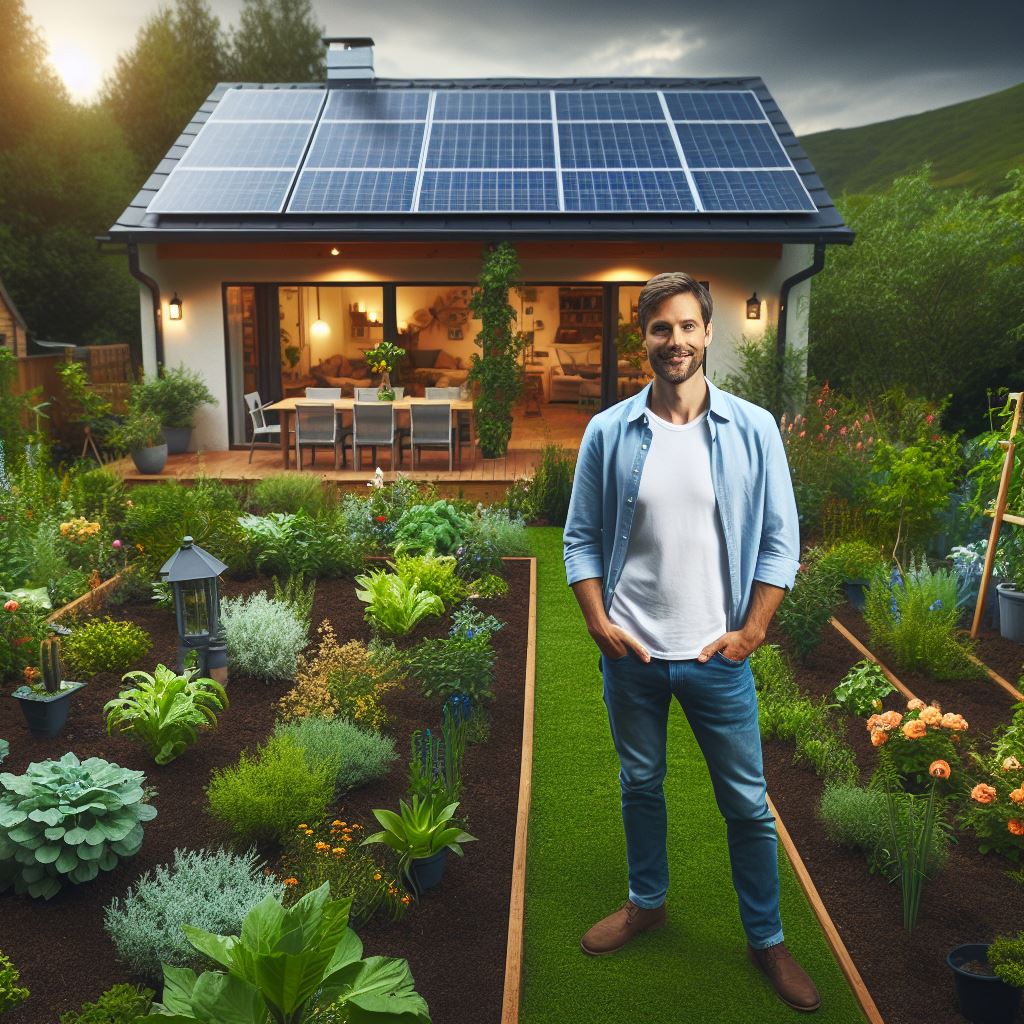Introduction
In the realm of property maintenance, a growing emphasis on sustainability has spurred a shift towards eco-friendly practices.
This post explores the burgeoning importance of adopting environmentally conscious methods in the real estate industry.
Eco-friendly practices in property maintenance encompass a spectrum of strategies aimed at reducing environmental impact.
From energy-efficient systems to sustainable landscaping, these initiatives prioritize resource conservation and waste reduction.
Green roofs, rainwater harvesting, and solar panels are just a few examples reshaping the landscape of property management towards a more sustainable future.
In property maintenance, eco-friendly practices extend beyond the obvious energy-saving measures.
The use of non-toxic, biodegradable cleaning agents and the implementation of smart irrigation systems showcase a holistic approach to sustainable living.
The adoption of eco-friendly materials, such as recycled or reclaimed wood, further promotes responsible sourcing in construction and maintenance projects.
The real estate industry plays a pivotal role in shaping the environmental footprint of communities.
Adopting eco-friendly practices is not merely an option; it is a necessity driven by the imperative to reduce carbon footprints and conserve resources.
Beyond the obvious benefits of lower utility costs, properties with eco-friendly features command a higher market value.
Homebuyers and tenants are increasingly discerning, seeking residences that align with their commitment to environmental responsibility.
Moreover, governments and municipalities are offering incentives for property owners who embrace eco-friendly practices.
Tax credits, rebates, and grants serve as tangible rewards for those who contribute to the broader goal of sustainability.
As the global community grapples with the consequences of climate change, the real estate industry stands at the forefront of mitigating its impact.
In fact, the adoption of eco-friendly practices in property maintenance is not just a trend; it is a fundamental shift towards responsible and sustainable living.
The real estate industry must embrace these practices to not only meet the expectations of a conscious consumer base but also to contribute meaningfully to a healthier and more resilient planet.
Energy-Efficient Appliances and Lighting
By incorporating energy-efficient appliances and lighting, property maintenance can make a substantial contribution to a greener and more sustainable future.
Lower energy consumption not only results in reduced utility costs for property owners, but it also has significant environmental benefits.
Importance of using energy-efficient appliances
One of the key advantages of using energy-efficient appliances is the lower energy consumption they require to perform their tasks. This directly translates into reduced utility costs for property owners.
By investing in energy-efficient appliances, property maintenance teams can help property owners save money on their monthly utility bills and increase their overall profitability.
Moreover, the use of energy-efficient appliances has a positive impact on the environment.
By conserving energy, these appliances reduce the demand for electricity, which often comes from non-renewable sources.
This reduction in energy consumption helps to minimize carbon emissions and lowers the carbon footprint of the property.
By decreasing greenhouse gas emissions, property maintenance teams can play an important role in combating climate change and promoting sustainability.
Types of energy-efficient appliances and their benefits
When it comes to energy-efficient appliances, there is a wide range of options available in the market.
Energy Star certified appliances are a popular choice.
These appliances meet strict energy efficiency guidelines set by the Environmental Protection Agency, ensuring significant energy savings.
By opting for Energy Star certified appliances, property maintenance teams can contribute to reducing energy consumption and greenhouse gas emissions.
Another aspect to consider is the lighting system within a property.
Traditional incandescent bulbs are highly inefficient and consume a significant amount of energy.
By replacing these bulbs with LED lighting, property maintenance teams can achieve both energy savings and longer-lasting bulbs.
LED lights have a longer lifespan, reducing the need for replacements and decreasing maintenance costs.
Examples of real estate properties implementing energy-efficient appliances and lighting
Real estate properties have already embraced the use of energy-efficient appliances and lighting.
Green Acres Apartment Complex, for example, implemented Energy Star certified appliances throughout their units, resulting in considerable energy savings.
Their commitment to sustainability has attracted environmentally conscious tenants who appreciate the lower utility costs associated with energy-efficient appliances.
Parkview Office Tower is another example of a property that has incorporated energy-efficient lighting.
By upgrading their lighting system to LED lights, they not only achieved significant cost savings but also enhanced the overall ambiance and productivity of the building.
In the case of new property developments, energy-efficient appliances have become a standard feature.
Sustainable Homes Development focuses on constructing properties that minimize their environmental impact.
By equipping their homes with energy-efficient appliances, they offer buyers the opportunity to reduce their carbon footprint and enjoy lower utility costs in the long run.
In short, energy-efficient appliances and lighting play a crucial role in property maintenance.
Lower energy consumption not only benefits property owners by reducing utility costs but also contributes to the global efforts in mitigating climate change.
By embracing energy-efficient practices, such as using Energy Star certified appliances and LED lighting, real estate properties can create a more sustainable future while improving their overall economic performance.
Read: 2024’s CRE Tax Incentives for Investors

Water Conservation Measures
Water conservation is a crucial aspect of property maintenance, as it promotes sustainable water usage and helps reduce water bills.
Importance of water conservation in property maintenance
- Sustainable water usage ensures the preservation of this valuable natural resource.
- By adopting water conservation measures, property owners can significantly reduce their water bills.
Water-saving fixtures and appliances
- Installing low-flow toilets and showerheads can greatly reduce water consumption.
- Dual-flush toilets allow users to choose between a lower or higher volume of water for flushing.
- Rainwater harvesting systems collect and store rainwater for various non-potable uses.
Success stories of real estate properties adopting water conservation measures
Several real estate properties have successfully implemented water conservation practices, leading to positive outcomes:
- A luxury resort in California reduced its water consumption by 30% through the implementation of water-saving fixtures and landscaping changes.
- A residential community in Arizona incorporated rainwater harvesting systems, resulting in a 50% reduction in their water bill.
- An office building in New York City installed low-flow toilets and showerheads, achieving an annual water saving of 2 million gallons.
Water conservation should be a priority for property owners and managers.
By adopting sustainable water usage practices and investing in water-saving fixtures and appliances, the property can benefit from reduced water consumption and lower bills.
Real estate properties that have already implemented water conservation measures serve as inspiring examples of successful initiatives.
It is essential for individuals and organizations to recognize the importance of water conservation in property maintenance and take necessary actions to protect this valuable resource.
Read: Sustainable Landscaping in Urban Developments
Green Landscaping and Outdoor Spaces
Implementing eco-friendly practices in property maintenance extends beyond just the interior spaces.
The outdoor areas, especially the landscaping and outdoor spaces, play a significant role not only in enhancing the aesthetic appeal of the property but also in contributing to sustainability efforts.
By implementing sustainable practices in outdoor spaces, property owners can enjoy various benefits while minimizing their environmental impact.
Benefits of implementing sustainable practices in outdoor spaces
Enhanced aesthetics
By incorporating eco-friendly landscaping practices, outdoor spaces can be transformed into visually appealing areas.
Native plants, natural elements, and creative design elements can significantly enhance the overall appearance and create harmony with the surrounding environment.
Increased property value
Well-maintained and environmentally friendly outdoor spaces not only attract potential buyers or tenants but also increase the property value.
Green landscapes are seen as valuable assets in real estate, as they contribute to a sense of tranquility and a closer connection with nature.
Eco-friendly landscaping techniques
Native plant selection
Choosing native plants for landscaping not only promotes biodiversity but also requires fewer resources for maintenance.
Native plants are adapted to the local climate, reducing the need for excessive watering, fertilizers, and pesticides.
They also provide habitat for local wildlife, contributing to the overall ecological balance.
Efficient irrigation systems
Installing efficient irrigation systems, such as drip irrigation or smart sprinkler systems, reduces water wastage and promotes water conservation.
These systems provide water directly to the plant’s roots, minimizing evaporation and ensuring that water is used efficiently.
Organic fertilizers and pest control methods
By using organic fertilizers and natural pest control methods, property owners can avoid the use of harmful chemicals that can negatively impact the environment and human health.
Organic fertilizers, such as compost or mulch, enrich the soil and promote its natural fertility.
Natural pest control methods, such as companion planting or introducing beneficial insects, help maintain a balanced ecosystem without relying on toxic pesticides.
Examples of real estate properties with eco-friendly landscapes
Green rooftops and vertical gardens
Some real estate properties incorporate green rooftops and vertical gardens, which not only provide aesthetically pleasing landscapes but also offer insulation and energy-saving benefits.
These green spaces reduce heat absorption, improve air quality, and create a more sustainable urban environment.
Community gardens and urban farms
In various urban developments, community gardens and urban farms are becoming popular features.
These spaces promote sustainable food production, enhance community engagement, and provide opportunities for residents to learn about gardening and sustainable practices.
Rainwater harvesting systems
Real estate properties might install rainwater harvesting systems to capture and store rainwater for irrigation purposes.
This approach reduces the reliance on municipal water sources and conserves water, especially during periods of drought.
In a nutshell, implementing eco-friendly practices in outdoor spaces brings numerous benefits.
From enhancing aesthetics and increasing property value to conserving resources and promoting biodiversity, sustainable landscaping techniques play a vital role in property maintenance.
By considering native plant selection, efficient irrigation systems, and organic fertilizers, property owners can create eco-friendly landscapes that contribute to a greener and more sustainable future.
Read: The Rise of E-Commerce and 2024 Warehouse CRE
Waste Management and Recycling
Waste management and recycling are essential aspects of eco-friendly property maintenance.
Properties that prioritize these practices not only contribute to a healthier environment but also improve the overall well-being of their communities.
Importance of proper waste management in property maintenance
Minimizing environmental impact is a key motivation for implementing effective waste management strategies.
By properly disposing of waste, property managers can prevent pollution, reduce greenhouse gas emissions, and conserve natural resources.
Additionally, it creates a healthier and more pleasant living and working environment for residents and employees.
Proper waste management is also crucial for complying with local regulations.
Municipalities have specific rules and guidelines regarding waste disposal, recycling, and hazardous materials.
By adhering to these regulations, property managers ensure they are operating legally and ethically, avoiding potential fines or penalties.
Compliance with local regulations also helps build a positive reputation and demonstrates commitment towards sustainability.
Implementation of recycling programs
Implementing recycling programs is an effective way to promote eco-friendly practices within a property.
Property managers should provide easily accessible recycling bins throughout the premises, strategically placed to encourage proper waste sorting.
Clear signage indicating what items can be recycled helps educate tenants and prevents contamination of recyclable materials.
Engaging tenants in the recycling process is crucial for the success of any program.
Property managers should actively communicate the benefits of recycling and provide educational materials to promote awareness and understanding.
Encouraging tenant participation through incentives, such as recognition or rewards, can increase engagement and commitment to recycling practices.
Case studies of real estate properties excelling in waste management and recycling
Green Heights Apartments
Green Heights Apartments in Cityville has implemented a comprehensive waste management and recycling program.
They have designated recycling areas on each floor with separate bins for paper, plastic, and glass.
The property management team regularly educates tenants on proper waste disposal and recycling practices.
Their efforts have resulted in a significant reduction in landfill waste and increased recycling rates among tenants.
Sustainable Office Park
The Sustainable Office Park in Townsville has implemented innovative waste management solutions.
They have installed a state-of-the-art waste sorting system that automatically separates recyclable materials from general waste.
The property management team collaborates with tenants to raise awareness and promote responsible waste disposal.
By implementing these measures, the Sustainable Office Park has achieved a recycling rate of over 70%.
Therefore, waste management and recycling play a crucial role in eco-friendly property maintenance.
By prioritizing these practices, property managers not only minimize environmental impact and comply with regulations but also create a positive image and improve the overall quality of life within their communities.
Read: Reducing Carbon Footprint in Office Spaces
Renewable Energy Integration
Advantages of incorporating renewable energy sources
Renewable energy integration in property maintenance is gaining momentum due to the numerous advantages it offers.
By incorporating renewable energy sources, properties can reduce their dependency on non-renewable energy.
This shift can significantly contribute to lower carbon emissions, leading to a more sustainable future.
Types of renewable energy options for properties
One of the primary types of renewable energy options for properties is the installation of solar panels.
Solar panels harness energy from the sun and convert it into electricity.
This clean and renewable energy source can power various aspects of the property’s maintenance needs, including lighting, heating, and cooling systems.
Another option for properties is the utilization of wind turbines.
Wind power is a viable renewable energy source, especially for properties in open and windy areas.
Wind turbines generate electricity by harnessing the power of the wind, making it a sustainable alternative to traditional energy sources.
Properties can also consider integrating geothermal energy systems.
Geothermal energy utilizes the stable heat from the Earth’s core to provide heating and cooling solutions.
This system taps into the Earth’s natural temperature, making it an efficient and environmentally friendly option for property maintenance.
Real estate properties embracing renewable energy practices
Real estate properties are increasingly embracing renewable energy practices.
Many commercial and residential buildings now incorporate solar panels on rooftops, utilizing solar energy to power their operations.
This not only reduces their carbon footprint but also helps them save on energy costs in the long run.
Moreover, large-scale property developers are incorporating wind turbines into their projects, taking advantage of the natural wind resources in certain areas.
These wind turbines can produce substantial amounts of electricity, making the properties self-sufficient in terms of energy generation.
In some cases, properties make use of geothermal energy systems for their heating and cooling needs.
These systems contribute to reducing the reliance on non-renewable energy sources such as gas and oil, making them attractive options in terms of energy efficiency and sustainability.
Overall, renewable energy integration in property maintenance presents significant benefits.
By opting for renewable energy sources such as solar panels, wind turbines, and geothermal energy systems, properties can reduce their environmental impact, lower carbon emissions, and contribute to a more sustainable future.
Embracing these practices not only aligns with eco-friendly values but also offers long-term cost savings and energy independence.
Conclusion
Eco-friendly practices in property maintenance are crucial for several reasons.
Firstly, they help create a sustainable environment by reducing the carbon footprint and conserving resources.
Secondly, these practices promote healthier living conditions, benefitting both tenants and property owners.
By adopting eco-friendly practices, real estate professionals can lead the way towards a greener future.
It is essential for real estate industry professionals to take the initiative in adopting sustainable practices.
By doing so, they not only contribute to a healthier environment but also enhance their reputation as responsible and forward-thinking individuals.
Implementing energy-efficient technologies, using eco-friendly materials, and implementing waste management systems are just a few ways to promote sustainability in property maintenance.
As we look towards the future, it is apparent that eco-friendly property maintenance is not just a passing trend but a necessary requirement.
With the increasing awareness of environmental issues, more people are demanding sustainable living options.
Therefore, incorporating eco-friendly practices will not only benefit the environment but also attract a larger clientele.
It is crucial for the real estate industry to adapt to these changing demands and embrace eco-friendly practices to ensure a prosperous future for all.




